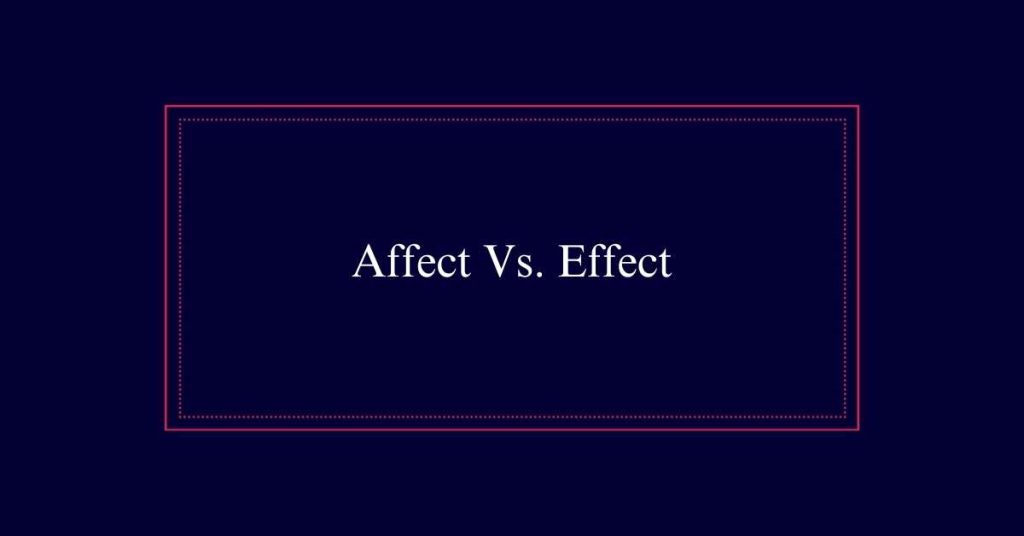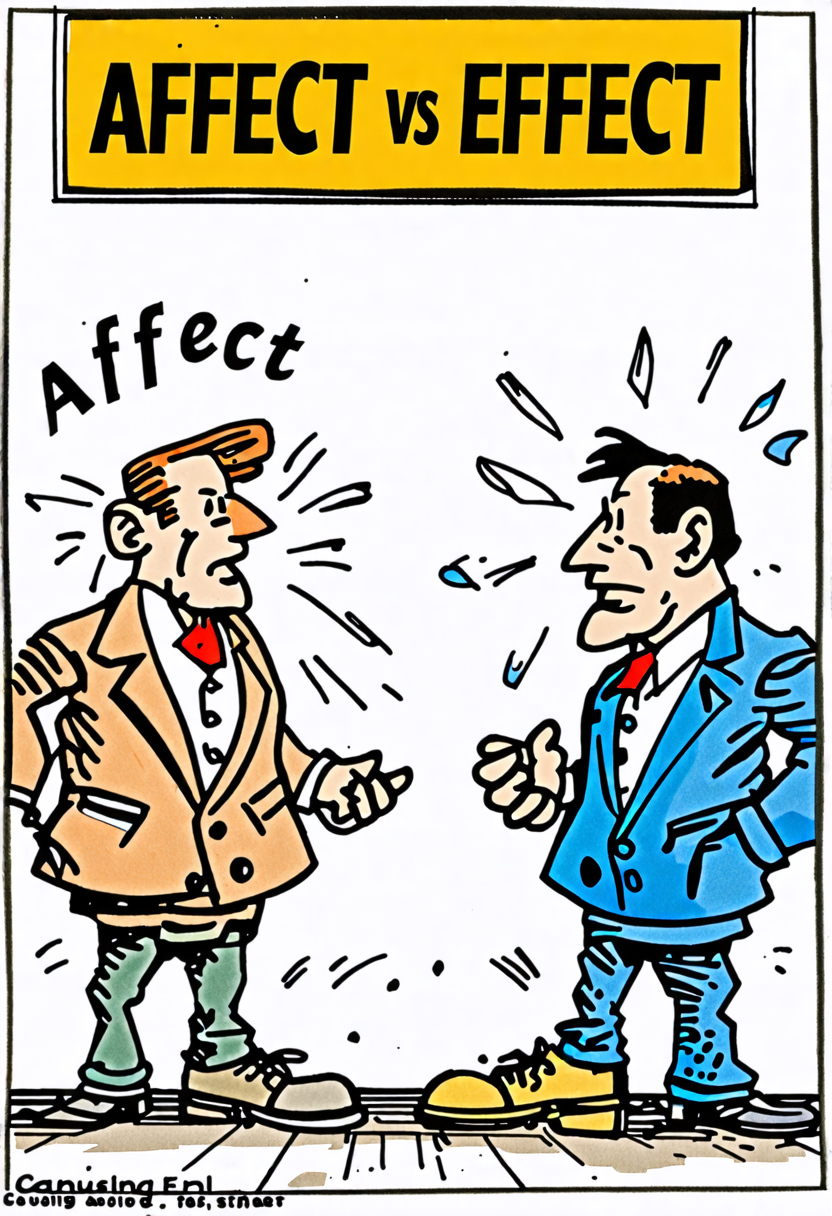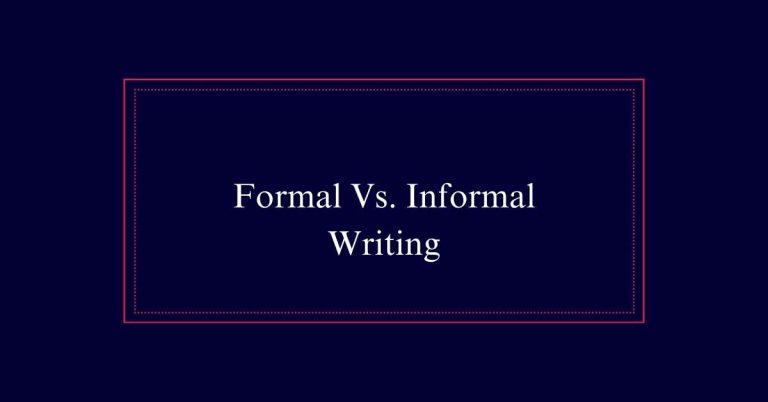Affect Vs. Effect
The difference between “affect” and “effect” is essential for precise communication. “Affect” is a verb that means to influence or change something. For example, stressful events can affect your health. “Effect,” on the other hand, is a noun that refers to the result or outcome of a change. For instance, regular exercise has a positive effect on well-being. Remember, if you are talking about an action, use “affect.” If you are referring to the result, use “effect.”
Defining “Affect”
Defining ‘Affect’ involves understanding its use primarily as a verb indicating influence or change. It describes how one thing can alter another.
For instance, gravity affects everything based on mass and distance. Emotional experiences affect individuals’ psychological states. Medicine can affect eyesight, demonstrating its impact on health.
Understanding ‘affect’ helps in recognizing how actions influence outcomes. For example, winning a medal can positively affect an athlete’s performance. Affect can also be seen in broader contexts, such as language affecting culture by shaping communication.
Synonyms for ‘affect’ include alter, change, influence, modify, and impact. Knowing these synonyms enhances comprehension of how ‘affect’ is used to describe the process of inducing change.
Defining “Effect”
Effect is primarily a noun that refers to the result or outcome of a change. It indicates what happens as a consequence of an action or event. For example, the effect of a new law might be a decrease in crime rates.
Similarly, the effect of exercise is often improved health. In many cases, effect is used to describe tangible or observable outcomes. It is important to distinguish effect from the verb affect, which means to influence.
Remembering that effect is about results can help in its correct usage. Examples include: the effect of pollution on the environment, the positive effect of education on society, and the calming effect of music on mood.
Verb Usage of “Affect”
While effect focuses on the outcome, affect as a verb is about influencing or producing change. For example, gravity affects everything based on mass and distance. This verb is often used when discussing how one thing can alter another.
Medicine can affect eyesight, showing its impact on health. Similarly, language affects culture by shaping communication. Emotional events can also affect individuals, leading to psychological changes. Affect is a versatile verb that describes how actions or circumstances bring about change.
Synonyms for affect include alter, change, influence, modify, and impact. Understanding how to use affect correctly can improve communication and clarity in writing. It emphasizes the action that initiates change rather than the result.

Noun Usage of “Effect”
In many contexts, the term ‘effect’ signifies the outcome or result of a particular action or event. This noun form is widely used to describe the consequences that follow specific actions or occurrences. The word ‘effect’ encapsulates the end result of a cause-and-effect relationship.
Here is a table illustrating various examples:
| Action | Effect |
|---|---|
| Taking medication | Relief from symptoms |
| Implementing renewable energy | Reduction in carbon footprint |
| Studying for an exam | Improved test scores |
| Exercising regularly | Enhanced physical health |
Understanding ‘effect’ as a noun helps in identifying the results produced by different actions. It is essential for clear communication in both written and verbal contexts.
Common Confusions
Despite understanding the distinct roles of ‘affect’ and ‘effect’, many people still find themselves confused when choosing the correct word.
One common confusion arises from their similar pronunciation. Additionally, both words involve change, which can blur their distinctions.
‘Affect’ is usually a verb that means to influence, while ‘effect’ is primarily a noun referring to the result. The confusion extends when ‘effect’ is used as a verb, meaning to bring about something.
Helpful cues include remembering that ‘affect’ is an action (verb) and ‘effect’ is an outcome (noun). Misusing these words can lead to ambiguity in communication, making it essential to understand their correct usage.
Real-life Examples of “Affect”
A clear understanding of ‘affect’ can be achieved by examining its use in real-life scenarios.
For instance, a sudden change in weather can greatly impact agricultural output, influencing farmers’ livelihoods. Similarly, stress and anxiety can impact an individual’s health, leading to physical and emotional challenges.
Educational methods also impact student performance, either enhancing or hindering learning outcomes. In business, market trends can impact sales strategies, requiring companies to adapt quickly.
Even social interactions can impact a person’s mood, altering their emotional state. By observing these examples, one can see how ‘affect’ as a verb plays an important role in influencing various aspects of life. Understanding this helps in correctly using ‘affect’ in different contexts.
Real-life Examples of “Effect”
Understanding the real-life examples of ‘effect’ can clarify its usage as a noun that signifies the result or outcome of an action. For instance, the effect of exercise on health is well-documented, showing improvements in cardiovascular function and mental well-being.
Another example is the effect of education on employment opportunities, where higher qualifications often lead to better job prospects. Environmental policies also illustrate this well; for example, stricter regulations can have a significant effect on reducing pollution levels.
Additionally, medication often shows clear effects, such as pain relief or symptom reduction. These examples help demonstrate how ‘effect’ is used to describe the outcomes resulting from specific actions or interventions.
Synonyms for “Affect”
Moving from the outcomes described by ‘effect’, it is equally important to explore the various synonyms for ‘affect’.
‘Affect’ primarily means to influence or change something. Synonyms for ‘affect’ include ‘alter’, ‘change’, ‘influence’, ‘modify’, and ‘impact’. Each of these words conveys a slight variation of the term ‘affect’.
For instance, ‘alter’ suggests a significant change, while ‘influence’ implies a more subtle effect. ‘Modify’ indicates adjustments, and ‘impact’ often means a strong or immediate change.
Understanding these synonyms can enhance our grasp of how ‘affect’ operates in different contexts. Using the right synonym helps convey precise meaning, aiding clearer communication. This depth of understanding enriches our language use.
Spelling Tips
Spelling tips can greatly assist in avoiding confusion between ‘affect’ and ‘effect’. One simple trick is to remember that ‘affect’ usually starts with an ‘A’ for ‘action,’ as it is mostly used as a verb. For example, ‘The news will affect his mood.’
On the other hand, ‘effect’ often starts with an ‘E’ for ‘end result,’ as it is commonly a noun. For instance, ‘The effect of the news was immediate.
Another tip is to use the phrase ’cause and effect’ to recall that ‘effect’ refers to outcomes. Practicing these distinctions can help guarantee correct usage in writing and communication. Keeping a list of example sentences can also reinforce understanding.
Emotional and Psychological Impact
The emotional and psychological impact of events can greatly influence individuals’ mental well-being. Affect, as a verb, describes how events can change someone’s emotional state. For instance, a traumatic event might affect someone by causing anxiety or depression.
Conversely, effect, as a noun, refers to the outcome of this emotional change. The effect of prolonged stress might be chronic mental health issues. Understanding the distinction is important for evaluating the consequences of events accurately.
When discussing emotional impact, recognize that affect describes the process of change, while effect denotes the resulting state. This clarity aids in effectively addressing and mitigating the psychological consequences of various experiences.
Frequently Asked Questions
Can “Effect” Ever Be Used as a Verb?
Yes, “effect” can be used as a verb. It means to bring about or cause something to happen. For example, “The new policy will effect significant changes in the organization.”
Are “Affect” and “Effect” Interchangeable in Any Context?
No, “affect” and “effect” are not interchangeable. “Affect” is typically a verb meaning to influence, while “effect” is usually a noun meaning the result. Their usage depends on the context of the sentence.
How Does the Pronunciation of “Affect” Differ From “Effect”?
The pronunciation of “affect” typically emphasizes the first syllable (ə-FEKT), while “effect” emphasizes the second syllable (i-FEKT). This distinction helps in differentiating the two words in spoken English.
Can You Provide Mnemonic Devices to Remember “Affect” Vs. “Effect”?
To remember the difference, use “A” for Action (Affect) and “E” for End result (Effect). “Affect” is a verb influencing change, while “Effect” is a noun describing the outcome.







